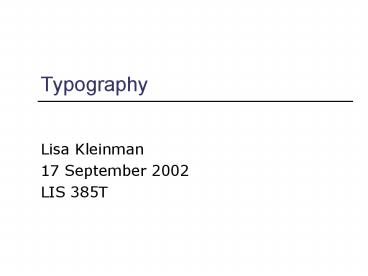Typography - PowerPoint PPT Presentation
1 / 21
Title:
Typography
Description:
Serif fonts have a stronger baseline. Serif generally better for body text ... Choosing Fonts for Web Sites. A study of fonts designed for screen display, ... – PowerPoint PPT presentation
Number of Views:133
Avg rating:3.0/5.0
Title: Typography
1
Typography
- Lisa Kleinman
- 17 September 2002
- LIS 385T
2
Definition of Typography
- Classic Layout of letters and spacing to convey
meaning and understanding - Modern A dynamic system of contrasts resulting
from the relationship of the type (its color,
form, rhythm, and style) to its background
Classic definition from www.cbbag.ca/Typography.
html Modern definition from Kahn Lenk, 1998
3
Typography in Info Architecture
- Type is a visual system
- Gives meaning and context
- Organization, labeling, navigation
- Hypertext link
- Heading
- Content information to be read by end user.
- This is some HTML code.
- Structural design of information
This is one section of information.
This information is a descriptor for the bold
text to the left.
4
Info Architecture Deliverables
- Conceptual Models
- Content Inventory and Organization
- User Flows and Scenarios
- Task Analysis
- Site Map
- Page Architecture (Wireframes)
Boxes and Arrows, Defining Information
Architecture Deliverables (www.webmasterbase.com/a
rticle/326/15)
5
Conceptual Model Example
By Noel Franus, CarbonIQ
6
Site Map Example
Designed by Chris Noessel
7
User Interface Design
- Visual structure
- Organizational landmarks
- Graphic cues and reader aids
- Differentiated information types
- Captions and annotated diagrams
Watzman, 1994
8
Page Architecture (Wireframes)
9
(No Transcript)
10
(No Transcript)
11
(No Transcript)
12
Reading on the Web
- Legibility
- Identification of letters, words
- Readability
- Typically measured by reading comprehension and
speed - People are scanning the page
13
Microsoft ClearType
- Redraws each pixel to smooth out font edges
- Setting in Windows XP
www.microsoft.com/typography/cleartype
14
Xerox PARC Enhanced Thumbnails
- Improving search results
15
Applying Typographic Principles
- Serif vs Sans Serif
- Serif fonts have a stronger baseline
- Serif generally better for body text
- Depending on screen resolution, serifs may get
lost - Letter and Word Spacing
- We read by distinguishing patterns
- Appropriate spacing allows the eye to read over
text easily
Watzman, 1994
16
Applying Typographic Principles
- Justified text vs Ragged right
- Justified columns distract the eye to move
downwards instead of horizontally - Black on White vs White on Black
- White type is usually less legible
- White text appears smaller
Watzman, 1994
17
Choosing Fonts for Web Sites
- A study of fonts designed for screen display,
Boyarski, Neuwirth et al., CHI Proceedings, 1998
(acm.org) - This paper also has some good references for how
people read on screens. See Gould, Dillon,
Mills. - Web typography lesson
- http//hotwired.lycos.com/webmonkey/01/45/index4a.
html?twdesign
18
Appendix
- Detailed information about
- typography history of fonts
- and technical terms
19
History of Type Styles
- Classical/Old Style 1450-1700
- Type sets based on handwriting/calligraphy styles
- Transitional 1700-1800
- Greater contrast between thick and thin strokes
- Increased type delicacy required improved
letterpresses - Modern 1800-1900
- Sharp contrast between thick and thin strokes
- Hairline thin serifs
- Bauhaus/Swiss Modern 1900-1960
- Geometrically designed sans serfis
- Contemporary 1960-Present
- Development of fonts specific to purpose or
medium (eg Adobe Postscript fonts)
20
Typography Terms (1 of 3)
- Letter Spacing
- Kerning fixes uneven spacing between letters
- Tracking adds or removes letter spacing between
all the letters
Before Kerning
After Kerning
Type examples from Paul Baker Typography
(www.pbtweb.com)
21
Typography Terms (2 of 3)
- Word Spacing
- Leading is the vertical space between lines
Type examples from Paul Baker Typography
(www.pbtweb.com)
22
Typography Terms (3 of 3)
- Ascender - The part of some lower-case letters,
such as a "b" or a "d" which rises above the
x-height. - Descender - The part of some lower-case letters,
such as a "g" or a "q" which drop below the
baseline.
Definitions from typoGRAPHIC (www.rsub.com/typogra
phic/)































